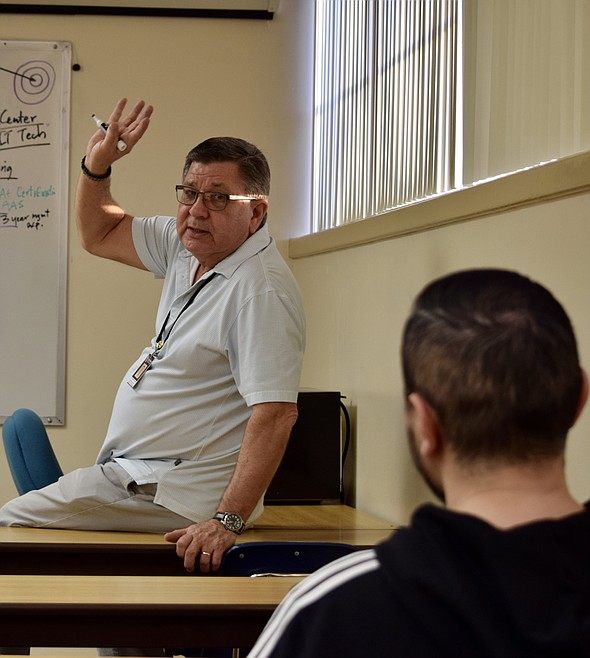Computer science students prepare for life after graduation
MOSES LAKE — Tom Willingham came to Big Bend Community College to teach computer science. You know, hardware, software, programming, networking. The stuff of computing.
But Monday night found him in a small classroom inside BBCC’s computer science building talking to a group of students about résumé writing, job interviews and how best to make that 20-second pitch or that 30-second “commercial” for themselves.
In short — how best to sell themselves to potential employers.
“What are those things that best describe you?” Willingham asks his students. “You have to figure that out.”
“I’m going to school,” responds 28-year-old Suzanna Diaz. “I’m trying to learn as much as I can, and I’m looking for work at a data center or something like that.”
Willingham nods his approval. It’s all part of the program.
Officially, that program is a two-year Associate in Applied Science degree that BBCC offers in computer network systems administration. Along with classes in programming and network technologies, and industry certification courses, students have to take English, math, psychology, sociology and public speaking.
These classes help students learn the “soft skills” needed to successfully find and keep jobs after they graduate.
“We give career advice,” said Willingham, an adviser in the program, outside the classroom. “And we start with advice to make sure they’ve chosen the right career.”
After that, it’s how to write cover letters, thank-you letters and résumés, how to do job interviews, even the kind of work ethic students need to succeed in their jobs.
“It’s what you really need to know to be successful at work,” he said. “We instill in them how to do that.”
Back in class, Willingham goes through the mechanics of looking for a job. Because résumés are frequently first reviewed by software, they should include the same key words and phrases in the job posting. Cover letters are also still important, Willingham tells his students, even if every quarter someone tells him they are obsolete.
“One résumé never cuts it. Customize your résumé for the job,” he said. “It takes the average manager 10 seconds to sort a cover letter and résumé and decide which pile they will put it in.”
The students, many of whom have been out in the work world already, seem to appreciate what Willingham is teaching them.
“This is my first year in the program,” said Diaz, 28, and a recipient of a Microsoft scholarship. “I hope to gain a job at a data center. I live in Quincy; it would be ideal.”
Diaz said it is good to know what employers want and are looking for in potential employees, especially since she is trying to change jobs, and move from her current position doing “dental consumer care” at Quincy Valley Medical Center to information technology work.
“The class is really beneficial,” she added.
Rob Decubber, 45, was one of the several hundred workers laid off by REC Silicon, and said that even after 23 years of work he thought it was good to know “how to format a résumé and interview correctly.”
“I want to work at a data center or with a company networking,” he said. “I want to stay local, and maybe have my own business.”
Willingham said the method BBCC is using in its systems administration program, this joining of soft skills with technical knowledge, can be adjusted for any number of workforce development programs.
For example, he outlined a proposed mission critical operations program BBCC is looking at creating that would train and credential students to oversee industrial processes the same way this current program trains computer systems administrators.
None of it works without what Willingham calls “the romantic trifecta” of student, community and industry. The computer programs wouldn’t be possible without the help of the region’s data centers, and Willingham said he is trying to get the same kind of industry support for the critical operations program.
“The community gets excited about it because they see people getting jobs with these great companies,” he said. “If we do it right, everybody wins.”
Charles H. Featherstone can be reached at [email protected].

